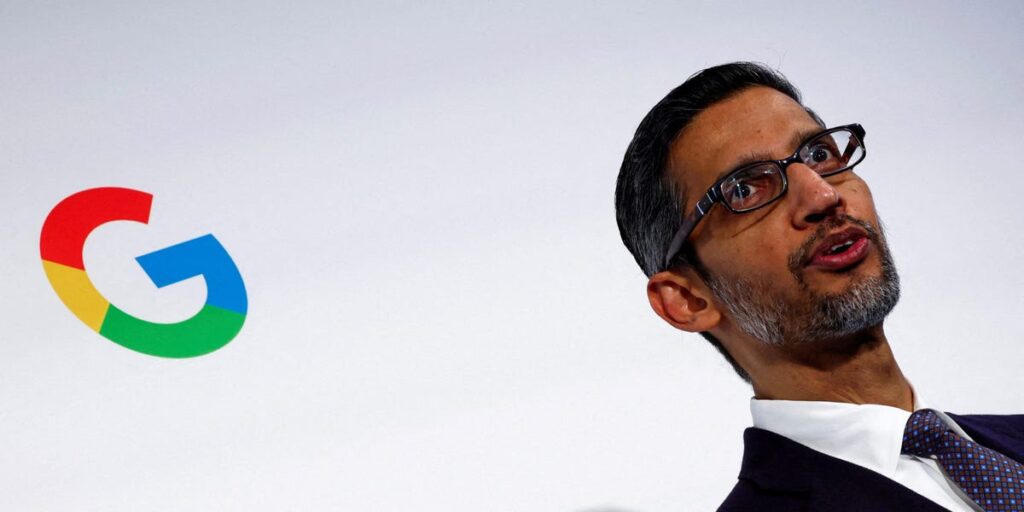Apple senior vice president of services Eddy Cue set alarm bells ringing on Wednesday after dropping a bombshell at Google’s antitrust trial: Google searches through Safari dropped in April for the first time ever.
While his comments triggered a frenzied sell-off in Google stock, it might not be the only reason the company’s watchers should be concerned about Google’s ability to keep full control over the search market.
A little-noticed number in Google’s latest financial disclosure may be the realest sign yet that investors have reason to worry.
After reporting blockbuster Q1 earnings last month, Google revealed in a 10-Q filing with the SEC that paid clicks for the quarter grew 2%, down from 5% growth in the same quarter a year ago. That’s the slowest growth rate since the company began reporting the metric.
Paid clicks are exactly what they sound like: people click on ads across Google Search and other services such as Google Play and Gmail. Each click translates to money in Google’s pocket.
Why those paid clicks are down, exactly, Google hasn’t said.
“It’s possible macro played a role, or searches with AI overviews delivered better results, requiring fewer ‘paid clicks’ to get to conversion,” Bernstein analysts wrote in a note published Wednesday. “But mostly, it’s a worrying KPI.”
The analysts said they believe the timing of the dip, combined with Cue’s comments and surging numbers of ChatGPT and Meta AI users, suggests that Google’s control of the search market may be lower than previously believed.
“Combined, we estimate Google’s search share is closer to 65-70% vs. the 90% we often hear,” they wrote.
Google declined to comment.
Google’s slice of pie
Google insists that it’s seeing more searches than ever.
Since the 2000s, the company has managed to harvest vast amounts of searches by paying Apple a fee to make its search engine the default on Apple’s Safari web browser. As recently as 2022, Google had paid Apple at least $20 billion — a massive fee that signals how much value Google sees in having Apple users turn to its search engine for all their queries.
It maintains that this partnership continues to drive growth in searches. Cue’s comments were provocative enough to prompt the search giant to issue a public statement stating that it continues to see “overall query growth” in Search, including an increase in total queries coming from Apple.
There’s little doubt among industry watchers that the overall search pie is growing — though figures from research firm Statcounter suggest Google’s control of the global search has fallen slightly. The big question is whether Google’s slice of that pie is shrinking relative to rivals.
According to Statcounter, Google’s share of global search traffic fell to 89.71% in March 2025, down from about 91% in March 2024 and about 93% in March 2023.
Meanwhile, competing search products are growing. In April, OpenAI said that around 10% of the world uses ChatGPT, which would be at least 800 million users. Meta also said that about 1 billion people use AI across its various products.
The search market expands with AI as chatbots and generative tools expand the definition of search. Google could reap the rewards here, though this also creates an opening for competitors charging as fast as possible to stay ahead of the search giant.
Bernstein analysts estimated that generative AI queries that run through chatbots such as ChatGPT are reaching volumes close to 15% of the queries processed by Google and other traditional search engines.
Analysts are split
Other analysts are divided on just how much of a threat Google’s search business faces.
For instance, longtime Apple analyst Ming-Chi Kuo took to X on Wednesday to explain why he felt it was a mistake to think generative AI would not affect Google’s advertising business.
He said that despite the “continued growth of Google’s advertising business,” the company hasn’t had much competition yet.
“GenAI service providers have not launched advertising businesses, so Google Ads remains the best choice for online advertisers,” Kuo wrote.
Kuo likened Google’s situation to the one Yahoo faced during the 2000s. The company’s advertising business, launched in 1995, only started declining in 2008, despite newfound competition from Google’s AdWords business arriving back in 2000.
Analysts at investment bank Jefferies have a different view. In a research note on Wednesday, the analysts had a particular word to describe the roughly $155 billion sell-off in Google’s stock following Cue’s comments: “overblown.”
While they acknowledged that Google’s AI-powered “Overviews” feature may act as a headwind right now as it is resulting in “fewer searches,” they said Google will “be able to ramp monetization” of its AI summary feature over the long run.
They also don’t see a scenario where Apple shifts away from Google and causes as much harm as investors might think.
“While Safari is significant, it does not represent the entirety of search activity; iOS accounts for 18% of operating systems, and Safari holds 17% of the browser market share compared to Chrome’s 66%,” the analysts wrote.
Have something to share? Contact this reporter via email at [email protected] or Signal at 628-228-1836. Use a personal email address and a nonwork device; here’s our guide to sharing information securely.
Read the full article here
















